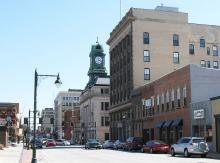Fort Dodge Looks to Re-Fortify with Fiber
Because its downtown buildings were made to resemble Windy City architecture, Fort Dodge was once nicknamed “Little Chicago.” But now, this north-central Iowa city with a population of just under 25,000 is building something the real Chicago, 360 miles east of Fort Dodge, does not have: a municipal fiber-to-the-home (ftth) network.
Having secured up to $36.8 million in loans from a consortium of local banks, the Cedar Rapids-based engineering firm HR Green has been hired by the city to put together a final engineering and design plan for a city-wide fiber network.
The RFP to do the construction work will go out to bid in late spring 2022, with actual network construction slated to begin in the summer of 2022. City officials say the new utility will likely begin offering high-speed Internet service to Fort Dodgers as soon as the summer of 2023, though the network won’t be fully built-out city-wide until 2024.
Unserved, Underserved and Poorly Served
In many rural communities, local governments, cooperatives, public entities, or nonprofit organizations will sometimes build the infrastructure necessary to deliver high-speed Internet service to the unserved and underserved because incumbent providers don’t see enough short-term ROI to justify the expense. But in more densely populated locales, municipal broadband is often pursued because the existing service from private providers simply isn’t up to par. The market has failed rural, suburban, and urban communities - just in different ways.
And that’s why in cities like Fort Dodge, the feasibility study commissioned by the city hits on a familiar refrain found in feasibility studies across the nation:
“Despite being the largest city in the region and key commercial hub, Fort Dodge telecommunications infrastructure is less advanced than in surrounding rural areas and small towns like Lehigh, Dayton, and Badger.”



